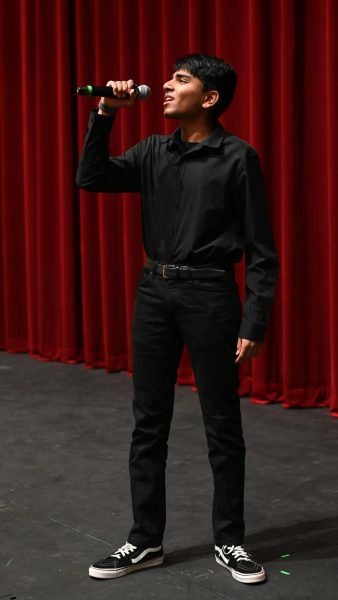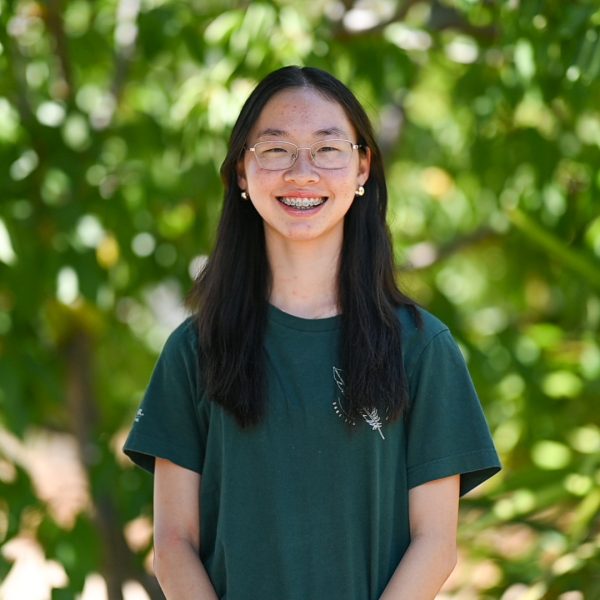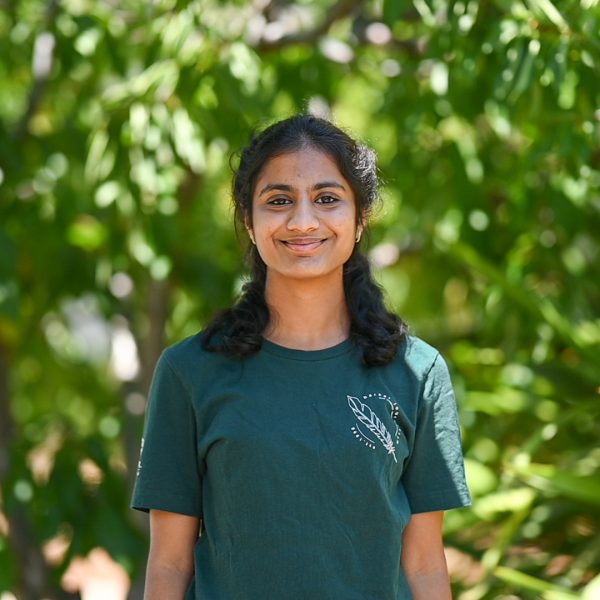
Eerie yet soothing beats fill the Patil Theater, pulsing slowly as soft blue light suffuses the stage floor. The singers’ gentle croons paint a scene from outer space of wispy nebulas and swaths of stars as they harmonize “Cells Planets” by Chanticleer. All of a sudden, the music cuts off and the lights flash off.
“Someone’s singing the wrong vowel,” Downbeat teacher Jennifer Sandusky says.
Without missing a beat, senior Varun Bhupathi raises his hand.
“It was me. I’ll fix it.”
A beat of silence, then laughter. The tension in the room breaks and everyone is at ease once more as Sandusky signals for the rehearsal to continue. Varun smiles, pleased at having relieved just a bit of the pressure of Downbeat’s upcoming competition.
Varun started taking solo singing lessons in second grade, and he began singing in a group capacity when his mother signed him up for a choir in fourth grade. Throughout middle school, he continued singing in Dynamics, Concert Choir and Vivace, and finally joined a cappella group Downbeat in junior year of high school. Close friend senior Vedant Balachandran, who has witnessed Varun’s personal and musical growth since sixth grade, recounts moments where he showcased his love for performing.
“Downbeat is really what he loves to do,” Vedant said. “I know how much work goes into it because he tells me all about it and I know how close the entire team is. It’s not a job for him because he’s doing what he loves, with people who are like his family.”
For Varun, the most enjoyable part of singing is not just in the performances, but the rehearsals. Although he cherishes the cohesive feeling of a final production, he appreciates practicing with his teammates the most.
“If you only sing because you look forward to the performance and not the actual rehearsals, then you shouldn’t do it,” Varun said. “My favorite memories are during rehearsal when we’re learning a new song and we get through a couple pages and you really start to hear the song coming together. Right when the song starts to get recognizable and you can see where it’s going is my favorite moment.”
In Downbeat, Varun is the first to help people learn from their mistakes and recognize what needs to improve. To create the best sound quality when singing, he emphasizes the importance of being supportive of making mistakes and letting go of any ego.
“There’s a lot of humility with singing,” Varun said. “A lot of it is calling yourself out, recognizing your own errors and having the humility to say you’re wrong. If you think something’s wrong, you’ve got to speak up. It goes both ways, the ability and the self-advocacy. If you think something could be different, or something else would make the sound better, you should say so.”
Although Varun is one of the more experienced members of Downbeat, he doesn’t always feel the need to always be a leader or a soloist. Instead, he offers more of a supporting role, and with a voice that can easily blend together in the ensemble, he will often sing in different vocal ranges. Sandusky commends Varun’s ability to adapt within Downbeat and his flexibility when asked to fill certain positions.
“You need the solid sound in the full group more so your soloist,” Sandusky said. “None of it can happen without core people on certain parts, and Varun has this voice that I can put anywhere. It’s a very valuable role, never a glamorous one, but that’s where the true leaders are. The true leaders are the people who don’t need an ego boost, and that’s who he is.”
Within his personal life, Varun also maintains the philosophy of not letting pride consume him and trying to find common ground with others. Whenever there is a disagreement, he always attempts to resolve it and find a solution that benefits everyone instead of solely focusing on his own wishes. Close friend senior Sriteja Kataru applauds his empathy and inclination to listen to others.
“Varun is very understanding, and he would be the first person to seek a compromise or try and figure out a situation where both of us are happy,” Sriteja said. “He’s an innate problem-solver at heart.”
Varun’s skills and patience also extend to data science research, which he began pursuing the summer before his junior year. His first research project explored if there was any correlation between the health of the economy and mass shootings. Building on his interest at school, he founded the Data Science Club. Through understanding the composure and open-mindedness that research requires, Varun has learned to implement the same care towards his interpersonal relationships.
“Sometimes doing research is like ramming your head into a brick wall,” Varun said. “Having that patience definitely translates to other things, because I try to fully understand someone’s opinion before I dismiss it. I’m less quick to judge because I’m better at slowing down in my own conversations with others.”
As the founder of Data Science Club, Varun must act as the leader and take full responsibility for coordinating and inspiring his team. Along with the frustrations of individual research, his leadership experiences have come with their own difficulties that he has had to overcome.
“It’s hard to manage your peers and also teach other people,” Varun said. “I have a team, and sometimes it can be hard to get all of us motivated and organized. Delegating and being more specific and direct about what needs to happen is very important. I’ve gotten better at leading, but sometimes, there’s still the mentality of, ‘You just got to do it.’”
From the countless hours spent in rehearsal and in front of his computer to the final product that he presents either to the stage or in a scientific paper, Varun finds that he enjoys every last moment. No matter the challenges he faces, from a traumatic solo singing experience to overwhelming stress, he cherishes looking back and seeing how he has grown.
“With singing, seeing yourself grow is very tangible,” Varun said. “When I do data science, I can see the reward and the process to get there. The satisfaction of gaining more knowledge and adding something to the human knowledge base is why I do it. Doing something that you can see your results in is very rewarding and something that I always look for.”


















![“[Building nerf blasters] became this outlet of creativity for me that hasn't been matched by anything else. The process [of] making a build complete to your desire is such a painstakingly difficult process, but I've had to learn from [the skills needed from] soldering to proper painting. There's so many different options for everything, if you think about it, it exists. The best part is [that] if it doesn't exist, you can build it yourself," Ishaan Parate said.](https://harkeraquila.com/wp-content/uploads/2022/08/DSC_8149-900x604.jpg)




![“When I came into high school, I was ready to be a follower. But DECA was a game changer for me. It helped me overcome my fear of public speaking, and it's played such a major role in who I've become today. To be able to successfully lead a chapter of 150 students, an officer team and be one of the upperclassmen I once really admired is something I'm [really] proud of,” Anvitha Tummala ('21) said.](https://harkeraquila.com/wp-content/uploads/2021/07/Screen-Shot-2021-07-25-at-9.50.05-AM-900x594.png)







![“I think getting up in the morning and having a sense of purpose [is exciting]. I think without a certain amount of drive, life is kind of obsolete and mundane, and I think having that every single day is what makes each day unique and kind of makes life exciting,” Neymika Jain (12) said.](https://harkeraquila.com/wp-content/uploads/2017/06/Screen-Shot-2017-06-03-at-4.54.16-PM.png)








![“My slogan is ‘slow feet, don’t eat, and I’m hungry.’ You need to run fast to get where you are–you aren't going to get those championships if you aren't fast,” Angel Cervantes (12) said. “I want to do well in school on my tests and in track and win championships for my team. I live by that, [and] I can do that anywhere: in the classroom or on the field.”](https://harkeraquila.com/wp-content/uploads/2018/06/DSC5146-900x601.jpg)
![“[Volleyball has] taught me how to fall correctly, and another thing it taught is that you don’t have to be the best at something to be good at it. If you just hit the ball in a smart way, then it still scores points and you’re good at it. You could be a background player and still make a much bigger impact on the team than you would think,” Anya Gert (’20) said.](https://harkeraquila.com/wp-content/uploads/2020/06/AnnaGert_JinTuan_HoHPhotoEdited-600x900.jpeg)

![“I'm not nearly there yet, but [my confidence has] definitely been getting better since I was pretty shy and timid coming into Harker my freshman year. I know that there's a lot of people that are really confident in what they do, and I really admire them. Everyone's so driven and that has really pushed me to kind of try to find my own place in high school and be more confident,” Alyssa Huang (’20) said.](https://harkeraquila.com/wp-content/uploads/2020/06/AlyssaHuang_EmilyChen_HoHPhoto-900x749.jpeg)




